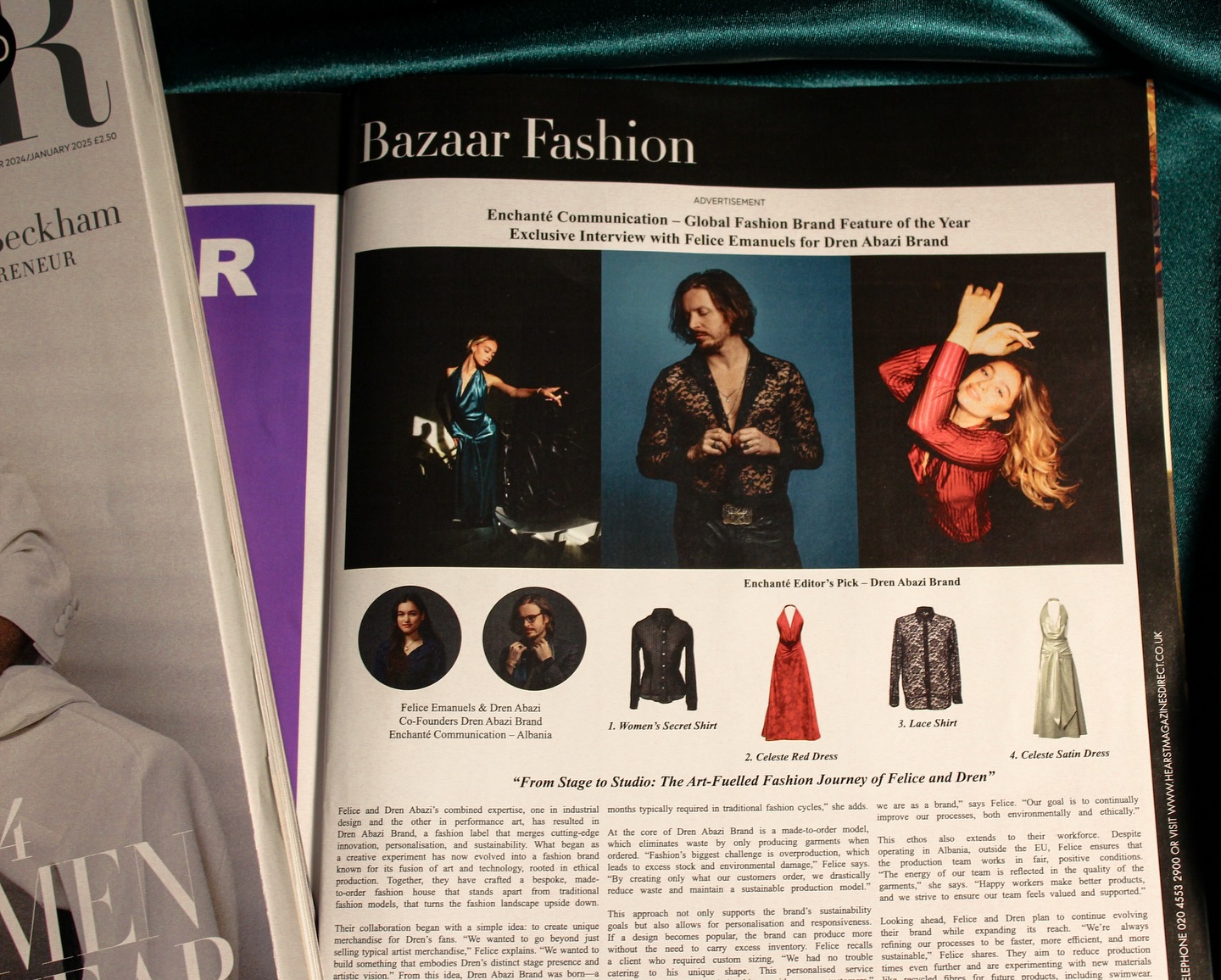Felice and Dren Abazi’s combined expertise, one in industrial design and the other in performance art, has resulted in Dren Abazi Brand, a fashion label that merges cutting-edge innovation, personalisation, and sustainability. What began as a creative experiment has now evolved into a fashion brand known for its fusion of art and technology, rooted in ethical production. Together, they have crafted a bespoke, made-to-order fashion house that stands apart from traditional fashion models, that turns the fashion landscape upside down.
Their collaboration began with a simple idea: to create unique merchandise for Dren’s fans. “We wanted to go beyond just selling typical artist merchandise,” Felice explains. “We wanted to build something that embodies Dren’s distinct stage presence and artistic vision.” From this idea, Dren Abazi Brand was born-a fusion of Dren’s bold style and Felice’s technical expertise. Dren’s input extends beyond aesthetics, influencing every design element. His on-stage persona and artistic expression inspire the garments, while Felice brings the designs to life through advanced digital printing technology. “It’s a fluid process,” says Felice. “Dren will come up with a creative concept, and I’ll translate it into prototypes using our innovative tools.”
One of the brand’s standout innovations is its use of digital printing technology, which allows them to print on fabric within minutes an approach that vastly reduces the time between concept and creation. “Our fabric starts out white, and with our digital printing, we can finalise a design in a matter of minutes,” Felice explains. “This flexibility lets us experiment with different colours, patterns, and styles on the spot and quickly adjust based on market feedback.”
With a palette of over 16 million colours, the possibilities for creativity are limitless. Felice notes that this technology allows them to test multiple variations of a design simultaneously, offering rapid prototyping and product turnaround. “We can introduce a new design to our customers in days rather than themonths typically required in traditional fashion cycles,” she adds.
At the core of Dren Abazi Brand is a made-to-order model, which eliminates waste by only producing garments when ordered. “Fashion’s biggest challenge is overproduction, which leads to excess stock and environmental damage,” Felice says. “By creating only what our customers order, we drastically reduce waste and maintain a sustainable production model.”
This approach not only supports the brand’s sustainability goals but also allows for personalisation and responsiveness. If a design becomes popular, the brand can produce more without the need to carry excess inventory. Felice recalls a client who required custom sizing, “We had no trouble catering to his unique shape. This personalised service helps build strong relationships with our customers.”
Dren’s artistic influence permeates all aspects of the brand, even down to the packaging. Each order is delivered in a cloth bag featuring a Spotify QR code that leads to a selected song from Dren’s music. “It’s all about creating a memorable unboxing experience,” Felice explains. “We want our customers to feel the connection between the music, the clothing, and the art.”
One of their most celebrated pieces is a sheer shirt that resonates with their audience for its versatility. “It’s a garment that can be worn boldly or styled in a more reserved way,” Felice explains. “Fashion should allow room for personal interpretation, and that’s what we aim to achieve with each piece.
Felice and Dren’s commitment to ethical production goes beyond reducing waste. They source their materials from trusted European suppliers, ensuring high standards in both quality and sustainability. Their printing process uses eco-friendly inks, and they are exploring natural fibre options for future collections. “Sustainability isn’t just a trend for us; it’s integral to who we are as a brand,” says Felice. “Our goal is to continually improve our processes, both environmentally and ethically.”
This ethos also extends to their workforce. Despite operating in Albania, outside the EU, Felice ensures that the production team works in fair, positive conditions. “The energy of our team is reflected in the quality of the garments,” she says. “Happy workers make better products, and we strive to ensure our team feels valued and supported.”
Looking ahead, Felice and Dren plan to continue evolving their brand while expanding its reach. “We’re always refining our processes to be faster, more efficient, and more sustainable,” Felice shares. They aim to reduce production times even further and are experimenting with new materials like recycled fibres for future products, including swimwear. Felice adds, “We’re excited to see how far we can push the boundaries of fashion and art. We’ve built a brand that’s responsive, innovative, and ethical, and we want to continue collaborating with our customers as we grow.”
At Dren Abazi Brand, fashion is more than just clothing-it’s a canvas for artistic expression, innovation, and responsibility. By embracing made-to-order, ethically produced garments, you’re not only wearing style but also supporting a more sustainable future for fashion.
This interview has been organized by Enchanté Communication and written by Fashion Editor Lupe Baeyens for the December 2024/January 2025 Harper’s Bazaar UK magazine.

0 comments